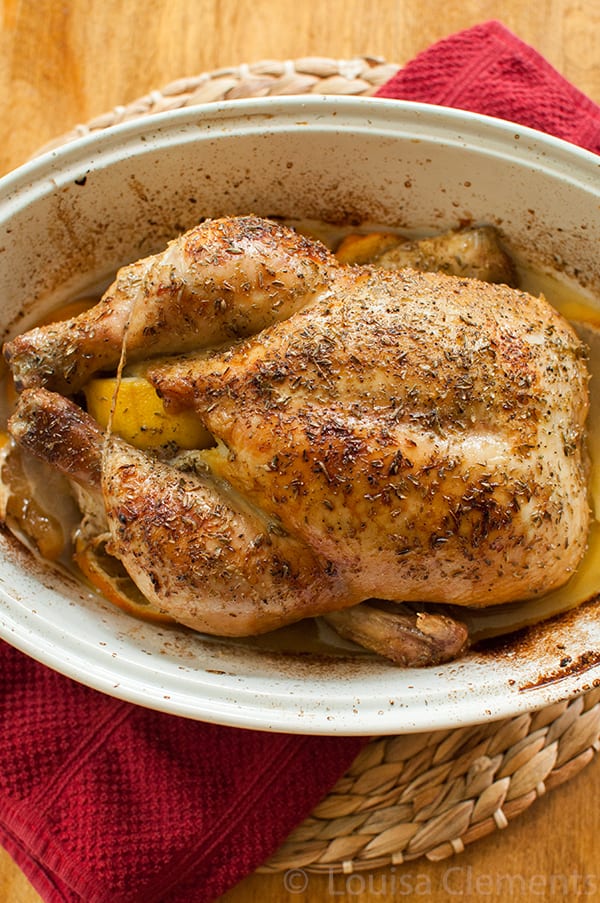I don’t consider myself a good cook at all. (Baking, yes. Cooking…. no way.) However, I’ve been really forcing myself to practice at least four times a week cooking something new in the kitchen. Using the Plated service has absolutely helped because the recipes always have one or two steps that push me outside my comfort zone.
Louisa is back again this week sharing her tips for improving your cooking. Honestly, these are so spot on! I wish I had read them four months ago when I first got going. I used to be afraid of using too much salt and would end up not using nearly enough… Now I’m better about tasting and adding salt as needed! Also, I signed up for a knife skills class and I’m really excited to learn a few new things.
5 Tips to Improve Your Cooking Overnight
Guest post by Louisa from Living Lou
If you read and follow these tips, I guarantee you’ll be a better cook tomorrow. How can I do that? These five tips for improving your cooking are incredibly simple, but they make such a difference to the quality of the meals you prepare. If you’re a somewhat experienced cook, some of these might seem obvious, but here are 5 things I wish I had known when I first started to cook.
1. Salt, salt salt.
Don’t be afraid of salt! We’ve all watched episodes of Top Chef or Chopped where the judges say that a dish needs more salt (such a tragedy!). Salt is the key to creating tasty, well-balanced meals. Keep in mind that salt shouldn’t make your dish taste salty, but instead it’s there to enhance and bring out the natural flavors of the dish. Don’t wait until the end to season, you want to season every step along the way – keep tasting every now and then to see how it tastes. Often, if a dish seems to be lacking a little something, add a touch more salt and it will brighten the flavors (also, be sure to use either sea salt or kosher salt).
Try it: I’ve been roasting a ton of vegetables recently as they are one of my favorite healthy, winter snacks. This roasted delicata squash recipe calls for ½ tsp of salt, which may seem like a lot at first glance, but you’ll notice the difference when you taste it. (p.s. you need to pick up delicata squash next time you’re at the store, it’s game changing).
2. Don’t be afraid of high heat
It’s easy to think that high heat = scary. But the truth is, high heat is a fantastic way to amp up the flavor of a dish. Getting that perfect sear on beef for beef stew helps to build layer of flavor that you’ll taste throughout a dish. I also love to cook chicken at a high temperature as this creates the perfect crispy skin .
Try it: Chicken thighs are a budget-friendly cut of chicken and I love the way the skin crisps up and the meat stays moist when cooked at 475F.
3. Make your own chicken stock
It’s so easy to pick up a carton of chicken stock at the store, but homemade stock has so much more flavor, and you have complete control over the flavor and seasoning. It’s also much more budget friendly to make your own stock. Just roast a chicken (this is my favorite roast chicken recipe), and then cover the bones with water, some aromatics (carrots, celery, onion and whatever herbs you have on hand), and simmer for about an hour. Strain, and you’ve got yourself chicken stock. You can keep it in the fridge, but I like to freeze it to save for later.
Try it: So where do you use chicken stock? Pretty much everywhere. Particularly in soups, my go-to during colder months is a Moroccan twist on chicken soup.
4. Use high quality ingredients
One of my grievances with the way we get our food now is that we are so far removed from the actual growing process that we forget that many of the fruits and vegetables we know and love aren’t native to North America. Depending on where you live, it can be difficult to get local, fresh produce year-round, but I do my best to eat with the seasons and buy as much local produce as I can. There is more flavor in in-season ingredients and it will drastically improve the flavor of your food.
Try it: Right now, squash is in season so a roasted acorn squash soup will be loaded with flavor.
5. Work on those knife skills
Sharper your knife and get practicing your slicing and dicing. Improving your knife skills will not only help you cook faster, but everything will cook evenly if it is cut the same size. There are many tutorials on YouTube for knife skills, so I recommend doing a bit of research and get practicing.
xoxo










A knife skills class sounds so cool! I'd love to try one sometime to help with my cooking skills! Thanks for the tips!
Laura
Laura Aime Vous
Oh my gosh, the chicken looks so yummy! Thanks for the tips x
Nabila / Young At Heart
I love that she mentioned high quality ingredients & that most people are so far removed from the growing process! As the daughter & wife of farmer's I see first hand how our food, both veggies & meat are grown and you can definitely taste the freshness from them versus store bought!
xoxo, SS
The Southern Stylista
I registered with Grokker and hope that got me entered. I couldn't see anything specifically that said "YOU are entered." Wilma Aguilar
These are great tips. I recently started cooking more and the more i do it the easier it gets.
XO Ellen from Ask Away
http://www.askawayblog.com
A knife skills class sounds like it would be beneficial for anybody! Thanks for sharing these tips!
Lauren,
http://www.atouchofsoutherngrace.com/